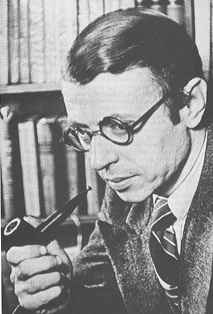In Existentialism is a Humanism, Jean-Paul Sartre discusses what is considered the central claim of existentialism, the proposition that "existence comes before essence" (3/18). He begins this piece by defending against the reproaches and criticisms made about existentialism, trying to prove that it is not really as pessimistic as it seems.
Essence is the attributes that make an object what it is, and without it's essence, the object loses its identity. An essence is never predetermined in a person, its constituted by them and how they make their decisions. Existence precedes essence, a notion that basically means that even though a person exists, nothing can control a person's character, choices, and desires. No "Man simply is. Not that he is simply what he conceives himself to be, but he is what he wills," (4/18). Sartre explains that this is the first principle of existentialism: that man is nothing but what he makes himself, saying that man is responsible for who he is and for his behavior. "Man first of all exists, encounters himself, surges up in the world – and defines himself afterwards," (3/18). Sartre goes on to say that this responsibility extends further than over just the man, but also for all of mankind. Once the man fully recognizes this "profound responsibility" placed on his shoulders, he feels begins to feel anguish and despair.

No comments:
Post a Comment